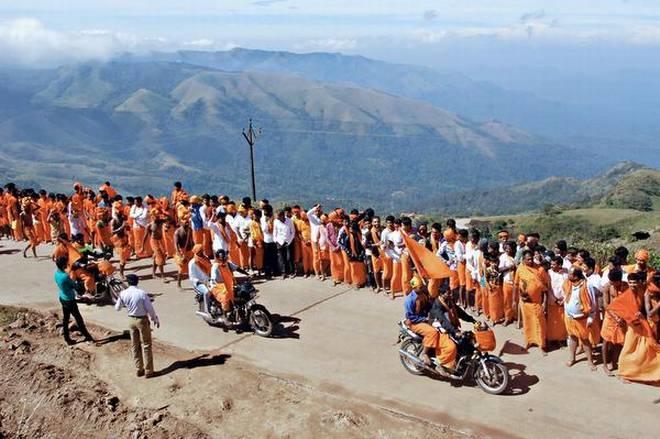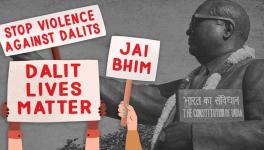Would BJP Like Some Coffee From Baba Budangiri?

Image Courtesy: Hindu
Baba Budangiri Mountain has increasingly become a hot bed for the communal politics of the Bharatiya Janata Party (BJP) and the Sangh Parivar in Karnataka. The dispute is over the religious identity of the shrine in Baba Budangiri, a mountain in the Baba Budan Mountain Range in the Western Ghats.
Who was Baba Budan? What is Baba Budangiri known for? And how are the BJP and the Sangh Parivar communalising the region?
The scenic Baba Budan Range in the Western Ghats, Chikmagalur, Karnataka is rich in natural resources and primarily famous for its coffee plantations. The hill range gets its name from the sufi saint, Hazarat Shah Janab Allah Magatabi, who was popularly known as Baba Budan. Legend has it that Baba Budan smuggled seven coffee seeds out of Mecca and brought it back with him to Chikmagalur. He sowed these seeds in the garden outside his hut in Chandra Drona hills, which later was named after him as Baba Budangiri. Baba Budan, thus, became the first to cultivate coffee in India.
It was only after Baba Budan successfully cultivated coffee plants that the Maharaja Krishna Raja Wodeyar III of Mysore gave away lands for coffee plantations in Chikmagalur. Coffee soon dominated the agrarian economy in the region, with many large landowners cultivating coffee. The refreshing Chikmagalur coffee that we sip on in India and elsewhere, today, and the sprawling coffee estates in Chikmagalur, stand as an evidence of this legend.
Baba Budan is believed to be one of the disciples of Hazrat Dada Hayat Khalandar, a disciple of the prophet who was sent to India to spread Islam in India. Some also believe that he was Dattatreya, an incarnation of the holy Trinity (Brahma, Vishnu and Shiva). The dargah of Hazrat Dada Hayat Khalandar is regarded as a symbol of the syncretic history of the state. A platform inside the shrine symbolises the peetha where Dattatreya performed penance, but it's also revered as the place where Baba Budan offered prayers. The shrine used to be revered by both Muslims and Hindus in the region. However, since 1975, it has been mired in a series of controversies.
The controversy began with the Karnataka Government transferring the administration of the dargah from the Muzrai department to Waqf board in 1975. The BJP and Vishwa Hindu Parishad (VHP) was successful in communalising this transfer. According to a fact finding report by People's Union for Civil Liberties (PUCL) and members of the Citizens for Democracy and South India Cell for Human Rights Education and Monitoring (SICHREM), that was brought out in January 2000, “It is only after 1975 that the dispute emerged regarding the management of the Dargah/Peetha. The then caretaker of the Dargah, Shah Khadri and two Hindu litigants challenged the government order making it a Waqf property. The judgement pronounced that the shrine is revered equally by the Hindus and Muslims, and ordered the status quo to be maintained. The court also upheld the rights of Shah Khadri regarding the inheritance.”
The BJP and the VHP, however, did not adhere to the Supreme Court’s judgment in 1998, and took out rath yatras and jeep yatras, attempting to appropriate the shrine as a Hindu site. These developments led to the Muslim community in the region feeling threatened and cornered, and increasing the tensions between the two communities, which eventually resulted in communal riots. A senior RSS pracharak, Surya Narayan Rao, was quoted telling a reporter of the News Minute, “Just like the case of Ram Mandir in Ayodhya, I am hopeful that our struggle for this shrine will soon yield desired results.” Following the controversy and the riots, Chikmagalur has come to be seen as a BJP stronghold. On 4 December 2017, a mob gathered at the shrine under the guise of offering prayers on the occasion of Dattatreya Jayanti. Shouting slogans of destroying the Islamic religious symbols in the shrine, they tried to force their way in. Fortunately, the mob was dispersed by the police present in the venue.
But the occasion is noteworthy because it is symptomatic of BJP’s use of communal politics, especially when seen in the light of the fast approaching Karnataka elections.
Disclaimer: The views expressed here are the author's personal views, and do not necessarily represent the views of Newsclick.
Get the latest reports & analysis with people's perspective on Protests, movements & deep analytical videos, discussions of the current affairs in your Telegram app. Subscribe to NewsClick's Telegram channel & get Real-Time updates on stories, as they get published on our website.
























